The contracts, which the MoD say will secure over 700 jobs at shipyards across the country, will support the UK’s Royal Fleet Auxiliary ships and the Royal Navy’s Survey and Hydrographic Fleet.
The deal covers 17 ships and will improve how spares, repairs and maintenance work are carried out.
Defence Minister Stuart Andrew said:
“This £1bn deal secures work for some of our world-leading shipyards into the next decade, supporting over 700 jobs for workers to ensure our ships remain at sea to defend the nation. This vital work is not only great news for our Navy, but also underlines the importance of defence to our national skills and prosperity.”
Agreements following a competition include expected to be worth:
- £357 million with Cammell Laird in Birkenhead to support the RFA’s Fort and Wave class tankers
- £262 million also with Cammell Laird in Birkenhead, to support the RFA’s new fleet of four 39,000-tonne Tide class tankers
- £239 million with A&P in Falmouth to support the RFA’s Bay class landing ships as well as the casualty ship RFA Argus and Royal Navy ocean survey vessel HMS Scott
- A £150 million contract with UK Docks Ltd on Tyneside to support the survey ships HMS Echo and Enterprise and the ice patrol ship HMS Protector.
The Government claim that the deal is expected to deliver savings worth over £100M for defence, with agreements including delivering improved support and greater efficiency in ways such as new support solutions and improved performance targets.
In addition to the four already signed, a further three contracts under the Future In Service Support (FISS) project are expected to be signed within the next year.
Defence Equipment and Support acting Chief of Materiel Ships, Neal Lawson said:
“Through the placing of these contracts and making changes to the way we provide support under this agreement, we will be able to deliver significant financial benefits.
These include savings expected to be more than £100 million over the course of ten years, as well as improvements in the performance, reliability, safety and sustainability of the RFA and hydrographic fleets.”



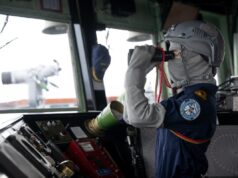



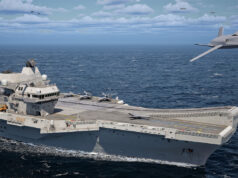

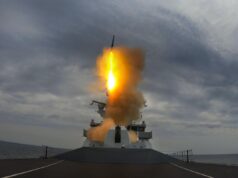
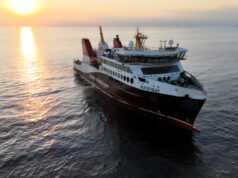
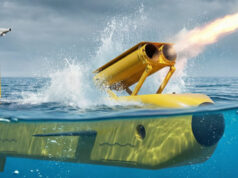
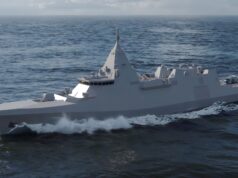

Great news for Falmouth, all we need now is the dredging tp be agreed.
Alot of announcements about spending money on this and that, and negotiations on buying stuff, just waiting for them to slip in the cuts.
(Chris H) – Piece by piece the good news keeps coming. Someone is at last looking to use all our civilian assets to support our military assets, spread the benefits as far as possible and get as much value as possible. No one can now say we don’t look after our ships big and small.
Just hope the fact Cammell Laird got the biggest slice here doesn’t mean that they will not be winning Type 31
So this could be the start of the NSS coming together (or me getting well ahead of myself)
CL becomes the UK’s large ship build and maintenance centre. With the requirement to build 25 large vessels over the next 25 years.
A&P getting the T31 build and maintenance contract (hopefully for 30 units over the next 25 years for an operational fleet of 25
Clyde to get the work bo build 13 T26 (8 + further 5 to replace T45)
Barrow to remain the submarine build centre with faslane as the home port.
Devonport/ Belfast to become the centre of excellence for building enabling/smalll vessels, such as CB90’s, Atlas, Workboats, Tugs, RHIBS and hopefully a fleet of 25 x 30m Patrol vessels (something like Safeboats Mk6) and S2S connectors
This really could be a golden opportunity to provide a sustainable drumbeat of build and support work to a number of yards and rejuvenate the industry.
We can do all the above on a fleet size of 80 Major vessels, excluding the enabling/small vessel requirements which will operate in shore or from a mothership (the enabling fleet will be 300-400 strong) and have a wide range of assets, as it does today.
This needs £3bn a year for build and probably the same for maintenance and support, so £6bn from our annual £18bn equipment budget seems very reasonable to me.
You are not going to keep a workforce of 5000 men and women in Devonport employed servicing tugs and bleeding patrol vessels as for “centre of excellence” do normal people use phrases like these in in everyday speech?asking for a friend.
I agree with you Mark
But what is not metioned on here is the fact that all T26s are to based at Devonport and also the anfibs are still in service for a few more years
Of course it was never mentioned as UKDJ seem to think that theres nothing other than Portsmouth
Beat me too it!
edit function required please! ‘to’ not ‘too’.
The T26s are to be based at Devonport – announced yesterday by Mr Williamson. Likelihood is that the T31s will be there too. Supports a few jobs!
Who said I was normal?
Maybe people don’t use those terms in normal usage but we really need to start projecting our country. Centre of excellence sounds better tha complex warships super glue factory doesn’t it
It’s a shipyard they are inherently noisy,dirty, fume laden, grime ridden dangerous work places most of the workforce in the industry are there under duress they would rather be anywhere than doing what they do there is no room or time for anything as esoteric as a Centre of Excellence this kind of crap just flys over peoples heads take it from me they are not interested.
Really? I have never met anyone in the shipyard industry in the US who didn’t love their pay and when the day was done appreciate they didn’t have to travel far from their families. The phrase that people in shipyard or refinery towns in the US about the fumes is -“What are you talking a about? Smells like money to me.â€
Also people who have any scrap of pride if you tell them they are the best (terms like “center of excellence†and “our premier shipyardâ€) While also demanding the best from them and paying them for the best when they deliver. You will get what you want on time and under budget. While also causing competition as everyone wants to be the “best†therefore complacency is less likely to set in, as the one top knows he is it until you find somebody better. What does not work is constant cheapskating and outsourcing it lowers workforce morale and entrance to the trade thus lowering the general level of skill available.
As for it being dangerous work? Most well paid work is unless your a doctor or lawyer. A Diesel mechanic or Jet engine mechanic can lose their fingers or smash their foot. A longshoreman can be smashed by a crane operator not paying attention. A oil field hand can be smashed by metal being collapsing under back pressure on the well head or burned or blown sky high. A trucker can smash his back and never be able to work as well again, or he can be hit by another truck or be hit by a teenager who is texting and driving while he is changing a tire. Yes working in a shipyard is dangerous but no more so than any other job that pays very well. If it wasn’t dangerous, hard, or complex work they would get the same pay as McDonald’s or Wal-Mart.
Remember no one works for nothing except for people sentenced to community service. Even charity workers are being paid in “feeling goodâ€.
Actually, if that is your view Marc then I am saddened.
Take a visit to Barrow in Furness the wealth of the whole area is linked to the shipyard and they would bit your hand off for more jobs.
Likewise the resurgence of CL is one I look at with pride. these are after all highly skilled workmen and women.
If I have offended you by using a common business term, so be it, but your views on people who work in shipyards is very old fashioned.
What you missed in concentrating on one term, is that if we handle this right, we can generate a whole load of manufacturing jobs in the UK, often in some of the poorest locations and I want to support that and make it happen.
So no work for rosyth or faslane…. they dont matter lol
Hopefully, this puts to bed any rumors surrounding the Wave class.
Wasn’t there a large support deal done, just before the last round of heavy cuts to the navy?
The contracts are not just for UK based support. If vessels are away from the UK and require maintenance or docking whilst deployed the contract covers that. So Bay class in the Gulf or in the Windies can be serviced in foreign yards from the contracted money.
As one who has been unfortunate to have repeat appointments for the RFA in cammell lairds, it is a huge waste of money. The quality of work is abysmal and that is being polite about it. RFA Fort Victoria was over a month late in meeting the live on board date and has not even managed to sail on its sea trials post refit
The RFA cluster has been there for over 10 years yet there is no infastructure to support the actual ships staff in the safe stowage of ISO containers or to receive MOD stores or to send items back to the MOD inventory.
In fact the same toilet in the portaloos has been broken for over 5 years.
For Lusty – RFA Wave Ruler has been laid up as will RFA Fort Rosalie and RFA Fort Austin, which has never come back into service following her multi million pound refit.